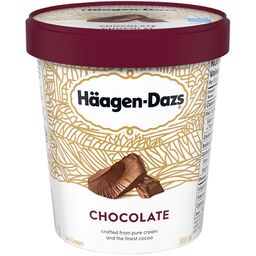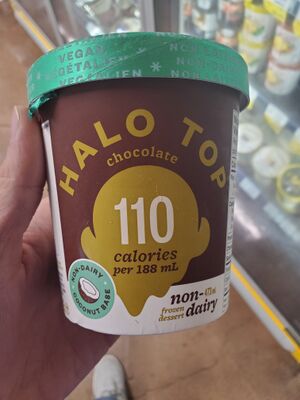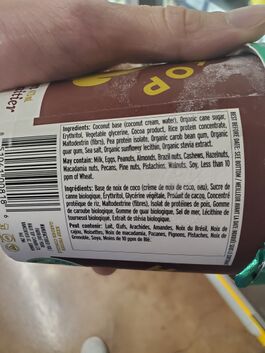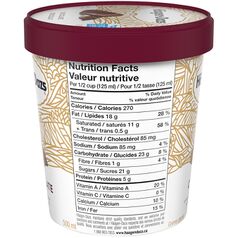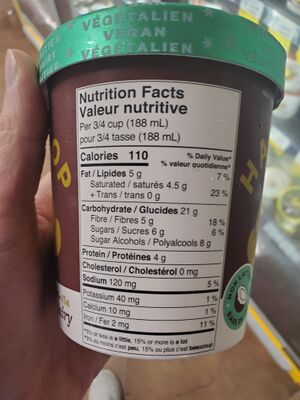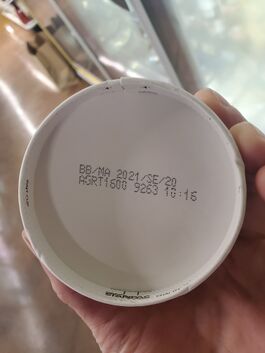Course:FNH200/Assignments/2021/Assignment 2 haagen-dazs Vs. Halo Top
The two products that we are comparing are both chocolate flavoured frozen desserts: Haagen-Dazs and Halo Top. Halo Top market itself as the healthier alternative to a traditional ice cream. So what is the difference between Haagen-Dazs, an ice cream, and Halo Top, a frozen dessert?
Haagen-Dazs vs Halo Top: Ingredients
| Haagen-Dazs Chocolate | Halo Top Chocolate |
|---|---|
|
|
Post pictures (Mandatory)
Halo Top: Fat Substitutes, Sugar Substitutes, Additives
| Fat Substitutes | About | Contribution to Halo Top |
|---|---|---|
| Carob bean gum[1] |
|
Thickens the frozen dessert to create a smoother mouthfeel texture |
| Guar gum[2] |
|
Thickens the frozen dessert to create a smoother mouthfeel texture
Reduces growth of ice crystals |
| Maltodextrin[3] |
|
Thickens the frozen dessert to create a smoother mouthfeel texture |
| Sugar Substitutes | About | Contribution to Halo Top |
|---|---|---|
| Erythritol[4] |
|
imparts sweet flavour while making the product low in calories |
| Organic Stevia Extract[5] |
|
imparts sweet flavour while making the product low in calories |
| Organic Cane Sugar[6] |
|
imparts sweet flavour |
| Additives | About | Role |
|---|---|---|
| Sunflower Lecithin[7] |
|
|
| Vegetable Glycerin[8] | Oil from vegetables |
|
- Identify fat substitutes, sugar substitutes, and/or additives used, if there is any
- Explain the roles of fat substitutes, sugar substitutes, and/or additives used in terms of the functional properties they contribute to the product
- Compare and contrast the lists of the two products and explain differences
Haagen-Dazs vs Halo Top: Differences
Haagen-Dazs uses cream and skim milk as a base for the ice cream and a source of fats, whereas Halo Top is diary free and uses coconut base, a mixture of coconut cream and water.
Haagen-Dazs uses sugar as a sweetening agent. Halo Top uses organic cane sugar as a sweetening agent as well as multiple sweeteners, erythritol and organic stevia extract. Erythritol is a sugar alcohol and it is used as a zero calorie bulk sweetener. Organic stevia extract is an extract from the stevia plant that is 250-300 times sweeter than table sugar.
Haagen-Dazs uses liquid egg yolk as an emulsifier to increase viscosity of the ice cream. To make Halo Top vegan, carob bean gum, guar gum, maltodextrin, and organic sunflower lecithin are used in place of egg yolk. Carob bean gum, guar gum, and maltodextrin are fat substitutes that thicken a product to make it high viscosity with a creamy mouthfeel. Organic sunflower lecithin is a fat that replaces the lecithin found in egg yolks. Sunflower lecithin is an emulsifiers that prevents separation of fat.
Haagen-Dazs uses cocoa to flavour the ice cream. Halo Top uses cocoa product and sea salt to flavour the product.
Halo Top also adds two types of protein, rice protein concentrate and pea protein isolate to increase the protein content of the frozen dessert.
In general, Halo Top has a longer ingredients list and utilizes multiple sugar and fat substitutes. The sugar substitutes, erythritol and organic stevia extract, are both zero calories, as they are not digestible. Maltodextrin, the fat substitute in Halo Top is also lower in calories than regular fat. These substitutes contribute to Halo Top's lower caloric value.
Labels (2 points)
Halo Top: With a serving size of 3/4 cup (188ml), this "frozen dessert" contains only 110 calories. It contains 5g of total fat, 4.5 g of that being saturated fat, which is 7% and 23% of your daily intake respectively. There is 0mg of cholesterol. 120mg of sodium, which is 5% of your daily intake. It contains 21g of carbohydrates, 5g of which is fiber and is 18% of your daily intake, 6g of which is sugar and 8g of sugar alcohol. It contains 4g of protein. Halo Top also contains 10mg of calcium which is 1% of your daily calcium intake, 2mg of iron which is 11% of your iron intake, and 40mg of potassium which is 1 % your daily intake.
Haagen-Dazs: With a serving size of 1/2 cup (125ml), this chocolate ice cream contains 270 calories, a far-cry from halo top's 110 calories. It contains 18g of fat, 11g of that being saturated fat and 0.5g being trans fat, which is 28% and a whooping 58% of you daily intake respectively. It contains 85mg of cholesterol. There is 85mg of sodium which is 4% of your daily intake. There is a total of 23g of carbohydrates, which is 8% of your daily carb intake, 1g being fiber, which is only 4% of your daily intake, 21g being sugar. It contains 5g of protein. Last it contains 20% of your daily intake of Vitamin A, 10% of Calcium, and 15% Iron.
These listings comply with the food labelling requirements set by the Canadian Food Inspection Agency (CFIA).
Food labelling requirements
- Bilingual labelling
- Common name of the food
- Country of origin
- Date marking and storage instructions
- Required for foods with a storage life of 90 days or less
- Identity and Principal Place of Business
- Irradiated foods
- Legibility and location
- List of ingredients
- Nutrition Facts table
- Net quantity of the food
- Sweeteners
- Other mandatory information for certain foods
References
Please use the Wikipedia reference style. Provide a citation for every sentence, statement, thought, or bit of data not your own, giving the author, year, AND page.
Note: Before writing your wiki article on the UBC Wiki, it may be helpful to review the tips in Wikipedia: Writing better articles.[9]
- ↑ Bjarnadottir, Adda (October 25,2019). "What Is Locust Bean Gum, and Is It Vegan?". healthline. Check date values in:
|date=(help) - ↑ Chang. L., Gerber. M., Hur. E., Jaakobs. A, Jiang. G., Konuthula. N., ... Xia. T. (2007). THE EFFECTS OF POLYSORBATE-80 AND LECITHIN ON STABLE FROZEN DESSERT.
- ↑ Tiefenbacher, Karl F. (2017). "Chapter Three - Technology of Main Ingredients—Sweeteners and Lipids". Science Direct: 123–225.
- ↑ "What Is Erythritol? Erythritol Side Effects And Dangers". Meritage Medical Network. May 14, 2018.
- ↑ Sollid, Kris (August 16, 2017). "What is Stevia Leaf Extract?". Food Insight.
- ↑ Sergi, Donna (December 13, 2020). "Is Organic Cane Sugar Bad For You? An Overview". HealthierU.
- ↑ "Lecithin". WebMD.
- ↑ Petre, Alina (December 19, 2018). "What Is Vegetable Glycerin? Uses, Benefits and Side Effects". Healthline.
- ↑ En.wikipedia.org. (2018). Writing better articles. [online] Available at: https://en.wikipedia.org/wiki/Wikipedia:Writing_better_articles [Accessed 18 Jan. 2018].
| This Food Science resource was created by Course:FNH200. |
